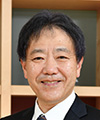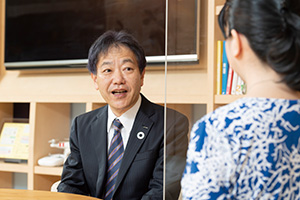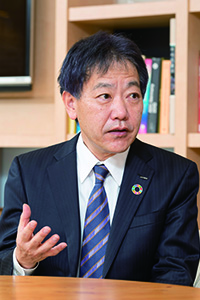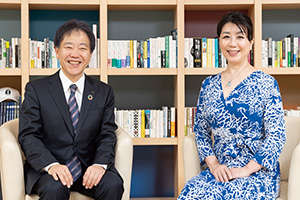 |
|||||
|
|
|||||
|
View from the Top Vol. 19, No. 4, pp. 1–6, Apr. 2021. https://doi.org/10.53829/ntr202104tp1
Sharing Philosophies and Values with Employees and Contributing to the Digitalization of SocietyOverviewThe spread of the novel coronavirus has brought about major changes in society. Now that remote life has become the norm, there is a growing need for supply chains that adapt to uncertain situations, safe and secure data linkage, and information technology infrastructure and security that support the changed business environment. The corporate philosophy of NTT DATA is to help contribute to a more affluent and harmonious society. We asked Toshi Fujiwara, senior executive vice president and representative director of NTT DATA, about the progress of the mid-term management plan and mindset of top management. Keywords: digitalization, NTT DATA Technology Foresight, center of excellence Profitable global growth should be emphasized— This year is the final fiscal year of the current mid-term management plan. Can you outline the progress of the plan thus far? NTT DATA has been strengthening its global expansion for about 15 years. Starting in Europe and the United States and now operating in 53 countries and regions, we have gradually gained experience and executed large-scale mergers and acquisitions. Our consolidated sales were approximately ¥2.27T in fiscal 2019 (April 1, 2019–March 31, 2020), and of our 133,000 employees, approximately two-thirds are non-Japanese nationals, among which the largest number are Indian. Our current mid-term management plan (fiscal years 2019–2021) [1] covers the critical three years for achieving the Global 3rd Stage by around 2025. By pursuing profitable global growth with consistent belief and courage to change, we are working on the four perspectives: growth, earnings, transformation, and synergy. While pursuing our global strategy and facing the prospect of accelerated digitization of society, we are concentrating our resources on increasing our strengths in new technological fields. Our key phrase is “profitable global growth.” In other words, it is not only the amount of profit but also the profit margin that is important. As the volume of business increases, the amount of sales naturally increases. However, I think that the increase in profit margin is proof that we are highly evaluated by our clients. In other words, the increase in profit margin is achieved because our clients recognize the value of the services we provide. High evaluation by clients also increases our motivation, so we will continue to increase client value through digital technology. Fiscal year 2021 is the final year of our current mid-term management plan. In fiscal 2019, the plan was successfully implemented; however, as we all know, in fiscal 2020, the spread of the novel coronavirus (COVID-19) greatly affected the world. We have spent a lot of time with the top management of each of our global bases to grasp the actual situation and consider countermeasures. Overseas bases have been hit by the COVID-19 pandemic harder than Japan; for instance, in Europe and the United States, about 95% of our employees are still forced to work from home. We usually report the previous fiscal year’s results and plans for the current fiscal year around May; however, at the time of the announcement of our fiscal 2019 results in May last year, we were in the midst of a state of emergency in Japan, which made it extremely difficult for us to report our plans and forecasts. As a result, we announced our fiscal 2020 earnings target in August 2020. Considering the results as of the third quarter, we are expected to achieve the fiscal year 2020 target. This achievement was made possible thanks to the hard work of our employees. I also believe that we were able to achieve this target because, in a sense, we recognized the change in society caused by the pandemic as a tailwind.
—How has the COVID-19 pandemic changed or will change NTT DATA’s business? If the services we provide stopped, that stoppage would affect not only our clients but also society. When the state of emergency was first declared in early 2020, we were concerned about whether we could really continue our services under such circumstances; however, we just kept doing what we could. At the beginning of the pandemic, we desperately tried to continue to provide services even if employees outside Japan handling our outsourcing business could not go to the office or visit our clients. Some had difficulty in ensuring remote-work environments because of the poor infrastructure in their countries. I can talk about it calmly now, but at that time, all the employees around the world worked frantically to create an environment and a system that would allow us to continue our business. I believe that we have been able to continue our business without any major disruptions as a result of the understanding of our clients in Japan and around the world as well as the efforts of each and every employee in the field. Therefore, I’d like to express my sincere gratitude to our clients and employees. As I mentioned, the COVID-19 pandemic has changed the way society works as a whole; as a result, the economic headwind tends to be the focus of attention, but the pandemic has also been a tailwind driving digitalization. This pandemic has forcibly accelerated the development of remote-work environments, and needs and issues have been clarified. I think that the areas in which our accumulated expertise and the capability of the entire NTT Group, i.e., technology, have expanded. In particular, demand for digitalization is growing significantly compared with the situation a year ago, and we need to further strengthen this area of business. With the establishment of Japan’s Digital Agency in September 2021, digitization of government offices and nationwide efforts toward the broader digitization of Japanese society are expected to gather pace. By leveraging our strengths, which include undertaking the digitization of many public offices and financial institutions as well as the development of infrastructure such as payment systems, I want us to actively work on the creation of mechanisms that connect all of society through digital technology.
Share our philosophy and values until they resonate with employees and go by the moto of “look at the big picture and start with small steps”— Many employees from all over the world have come together to face an unprecedented situation. To expand our business by uniting our 130,000 employees in 53 countries and regions, I have consistently communicated that it is important to share not only profit goals but also philosophies and values while emphasizing diversity. In particular, it is important to build long-term relationships with our clients. Generally, people might have the impression that the rapidly growing information technology industry is simply focused on selling technology in a short period, but we are different. We place great importance on building strong relationships with our clients for the long term. In the course of such a strong relationship, sometimes the client is struggling, and sometimes we are struggling; all the same, I believe that if we understand each other, we can overcome such difficult times. The attitude that I described above underpins NTT DATA’s group vision of being a Trusted Global Innovator, which was set forth on the occasion of the 30th anniversary of the company’s founding. Long-term relationships are essential for building trustworthy relationships with clients. When we ask companies to join us through mergers and acquisitions, we confirm whether we can share these philosophies and values with them. To achieve our group vision, the following three values are shared by all group employees and practiced by them on a daily basis. The first value is clients first. Our approach to system integration is to (i) understand the client’s way of thinking and true objectives and (ii) propose the best solution for the client from a medium- to long-term perspective. For example, if we receive a request from a client that we deem will be unbeneficial to them in the future, we will clearly communicate that fact to them and propose an alternative solution. The second value is foresight, namely, looking to the future of technology and society and proposing necessary technologies and services to society and clients. As an example, every year, we publish “NTT DATA Technology Foresight,” forecasts based on research and analysis of advanced technologies and societal trends [2]. We want our clients to continue expecting us to propose ways to move forward. The third value is teamwork. There is a limit to what we can do on our own, and especially in the case of large-scale projects, we need to work together with our clients, not just with people within the company, to achieve our goals. By overcoming difficulties together, we can build a strong relationship and recognize each other as brothers and sisters in arms. I still have strong bonds with clients from my time as a section manager, and even though my position has changed, I have kept those relationships for more than 20 years. Those relationships are not only personal assets but also corporate assets. — What are some of the important things that you do to make corporate philosophy a reality? I think that top management must have a clear vision, disseminate that vision, and involve the people around them. On top of that, they must not only make sure that employees understand the vision but also keep communicating it until it resonates with them. That process continues until all employees can talk about the vision naturally. Also, even if an idea is great, the reality may not go as planned. I want employees across the world to value the following three key phrases. The first is “interactive communication.” It is important to keep in mind that communication is the mutual exchange of information. Sometimes we communicate in a one-way manner by which we are not aware of the understanding of the other party and end up saying, “I told you that, didn’t I?” or not listening to what we don’t want to hear. We want to avoid such one-way communication and emphasize interactive communication. The second is “mutual respect.” Although there should be no hierarchical relationship between a client and a contractor, they sometimes misunderstand the relationship. If we take the initiative and say, “Let’s respect each other as professionals,” the other person may be willing to talk what they have to say. The third is “passion and perseverance.” I believe that it is important for leaders to show their readiness to team members because it will ensure their sense of security and motivation. To be honest, I used to feel a little nervous when presenting my plans. Even so, when I finished a project, I realized that it was the right thing to do. And when I received a message saying, “I was really impressed by your plan,” I felt happy that I was able to share my thoughts with team members. I have adopted the motto, “Look at the big picture, start with small steps.” I am always looking at societal trends from a broad perspective and trying to find out as much as I can about what society and our clients expect from NTT DATA. I am in charge of technology strategy as well as management and personnel strategies. Accordingly, while pursuing social contribution through technological development, I am conscious of growing NTT DATA into a strong company by using our technological capability from a broad perspective. I always keep in mind NTT DATA’s unique global management. At each layer of technological development ability and contact point with clients, I want to proceed with our business by using the common assets of the NTT DATA Group.
Establish a relationship of trust while sharing the responsibilities— You joined NTT DATA in the first year of privatization of NTT, and you have been with NTT DATA through its development. My induction ceremony in 1985 was also the unveiling of the “dynamic loop,” which is NTT’s logo, and I still remember looking at the loop on a large display. In 1988, I had an opportunity to study in the United States to obtain an MBA. At the time, the importance of management with a thorough understanding of technology was being discussed in the U.S., and Cornell University, where I studied for my MBA, was considering a joint program in engineering and business administration. That discussion probably led to the original concept of MOT (Management of Technology). International students from various countries, including myself, with a background in technical expertise were selected, and we had a challenging time completing a double degree of MBA and M.E. (Master of Engineering) in two years. During the 35 years since I joined the company, I have been through many difficult times. I have been involved in developing many systems for financial institutions in Japan; for instance, I was in charge of a system that was so mission-critical that any failure would have had a fatal impact on the execution of business. When building a mission-critical system, the simple approach is to apply established means; however, we agreed with the client to build a system by looking 20 to 30 years into the future and made the bold decision to actively incorporate state-of-the art technology. Since the system used the latest technology in each layer, technical issues piled up one after another. Seeing no clear future in sight, our employees were exhausted from the back-and-forth with international vendors as deadlines loomed. I declared that we intended to carry out the project through to the end and tried to coordinate with stakeholders, exploring the possibility of “sharing the responsibilities,” so to speak. We built a relationship of trust, sometimes through heart-to-heart discussions, sometimes through a mixture of taking a hard line or a soft line. Consequently, we were able to align the targets of the entire project while confirming what we could and could not compromise. Thanks to this experience, I value a relationship of trust for moving forward while sharing the responsibilities. I also realized the importance of showing an attitude of persevering through to the end. — Please give us a few words on future technological developments and for engineers. We want to build on our strengths by aggregating technologies such as artificial intelligence (AI), blockchain, and software engineering in the technology layer. One of the measures in our mid-term management plan to achieve the expansion of global digital offerings is to enhance centers of excellence (CoEs). This measure is an initiative to contribute to digital transformation of our clients by leveraging the worldwide network of the NTT DATA Group to aggregate knowledge and provide training, technical support, and assets across the world. Up until now, we have been working in four areas: blockchain, digital design, Agile/DevOps, and AI. We have also established CoEs in Internet of Things, intelligent automation, and software engineering automation, which are indispensable for digitalization and in which we should differentiate ourselves. It is difficult to tackle all issues at the same time, so we “look at the big picture and start with small steps” and will narrow down where we need to start and work on it thoroughly. To our engineers, technology is your strength as well as the common language of the world. While it is important to be interested in new technologies, it is also important to have your own core expertise and use it as a yardstick for your activities. I once heard an electrical engineer describe a dispute as, “We have a resistance circuit here,” and I couldn’t help but be impressed by that comment. I am sure that you all have your own special skills, so I want you to make the utmost effort to polish them and broaden them or add something new. I myself am not shy in asking younger employees to teach me what I don’t know to update my knowledge. Indeed, lectures by younger employees are stimulating and fun. Although it takes time, we, engineers, have to constantly build up our skills. References
Interviewee profileCareer highlightsToshi Fujiwara joined NTT in 1985 and NTT DATA in 1988. In his career at NTT DATA, he became senior vice president and head of the Fourth Financial Sector in 2014, executive vice president and director in 2017, and senior executive vice president and representative director in 2018 in charge of the financial segment, Americas & Europe segment and global marketing. He became senior executive vice president and representative director, chief technology officer, chief knowledge officer, chief information security officer, chief financial officer, chief human resources officer and chief risk officer in June 2020. |
|||||












